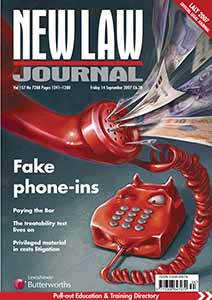THIS ISSUE

Rumours of the death of the “treatability test” have been greatly exaggerated, says David Hewitt
Tim Crosley and Michael Walsh analyse the implications of HMRC’s defeat in Sempra
MORE TEETH FOR DDA 1995 >>
RIGHT TO LIGHT >>
COHABITATION >>
In brief
Do solicitors still have to pay counsel under the new code of conduct? Barbara Hewson investigates
In brief
The House of Lords needs to sort out the mess which has emerged from its ruling in R v J, says Jonathan Rogers
In re Officer L [2007] UKHL 36, [2007] All ER (D) 484 (Jul)
In brief
MOVERS & SHAKERS

Boies Schiller Flexner—Tim Smyth
Firm promotes London international arbitration specialist to partnership

Katten Muchin Rosenman—James Davison & Victoria Procter
Firm bolsters restructuring practice with senior London hires
.tmb-mov69x69.jpg?sfvrsn=775f80cc_1)
HFW—Guy Marrison
Global aviation disputes practice boosted by London partner hire
NEWS
Writing in NLJ this week, NLJ columnist Dominic Regan surveys a landscape marked by leapfrog appeals, costs skirmishes and notable retirements. With an appeal in Mazur due to be heard next month, Regan notes that uncertainties remain over who will intervene, and hopes for the involvement of the Lady Chief Justice and the Master of the Rolls in deciding the all-important outcome
After the Southport murders and the misinformation that followed, contempt of court law has come under intense scrutiny. In this week's NLJ, Lawrence McNamara and Lauren Schaefer of the Law Commission unpack proposals aimed at restoring clarity without sacrificing fair trial rights
The latest Home Office figures confirm that stop and search remains both controversial and diminished. Writing in NLJ this week, Neil Parpworth of De Montfort University analyses data showing historically low use of s 1 PACE powers, with drugs searches dominating what remains
Boris Johnson’s 2019 attempt to shut down Parliament remains a constitutional cautionary tale. The move, framed as a routine exercise of the royal prerogative, was in truth an extraordinary effort to sideline Parliament at the height of the Brexit crisis. Writing in NLJ this week, Professor Graham Zellick KC dissects how prorogation was wrongly assumed to be beyond judicial scrutiny, only for the Supreme Court to intervene unanimously
A construction defect claim in the Court of Appeal offers a sharp lesson in pleading discipline. In his latest 'Civil way' column for NLJ, Stephen Gold explains how a catastrophically drafted schedule of loss derailed otherwise viable claims. Across the areas explored in this week's column, the message is consistent: clarity, economy and proper pleading matter more than ever









